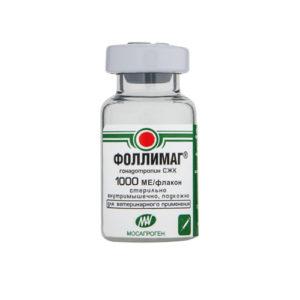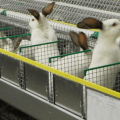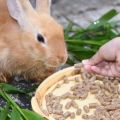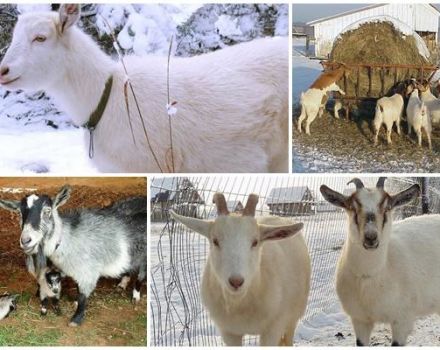Treatment of biting midge in rabbits with folk remedies and drugs, symptoms
Bum, or stomatitis, in rabbits is treatable. This is a viral disease in which the mucous membranes of the mouth become inflamed and saliva flows out profusely. The virus mainly infects young animals. Small rabbits, separated from the mother, need to carefully select food. It is important to ensure that the food is complete and that the rabbits eat clean grass, vegetables and grains. Animals should be kept in dry cages, then they will not get sick.
Causes of the disease
Chickpea, wood lice or wet muzzle is the popular name for viral stomatitis, that is, inflammation of the mucous membrane of the mouth and tongue of rabbits. The disease is characterized by profuse salivation. A sick rabbit has constantly wet hair around the mouth. The virus actively develops in the saliva of the animal, as well as in its blood and urine. One sick rabbit can infect all livestock. Infected animals must be immediately isolated, that is, transplanted into a separate cage.
Stomatitis is most common in young rabbits that are 1-3 months old. Young animals get sick with woodlice when the animals are transplanted from the rabbit and transferred to independent food. In all likelihood, stomatitis is the body's reaction to new green food. During this period, the rabbits need to be given dried hay, crushed dry grain, clean roots and vegetables.
Nutritional errors lead to stomatitis. At first, the virus is picked up by weakened rabbits, which are poorly fed, but after 1-2 weeks the infection affects all livestock.
The cause of the disease is infection. The virus can be found in dirty food and water, in cages and equipment, and carried by rodents. Stomatitis develops in a humid and hot environment, in stuffiness. Rabbits get sick if their cages are rarely cleaned. The virus also infects adult rabbits, weakened by frequent mating. The disease occurs at any time of the year, but more deaths occur in the spring and autumn.

Symptoms of a wet face
The incubation period of a viral disease lasts only 2-4 days. Affected rabbits have decreased appetite. The mucous membrane of the mouth and tongue turns red. Then the oral cavity is covered with white spots. Soon, the lesions change color and turn yellow, then brown. Erosions and ulcers occur on the mucous membranes of the tongue, gums, lips.
Infected animals have increased salivation. Saliva flows out of the corners of the mouth. Around the muzzle, on the chest, constantly wet and glued hair. Wool falls out on the lower jaw, pustules form. A sick animal diarrhea, refuses to feed, sits motionless, quickly loses weight. The disease lasts about 10-14 days.Most often, rabbits get mild stomatitis, and then recover.
In animals with weak immunity, a severe degree of illness occurs, they die within 3-5 days. The mortality rate of young animals is 20-70 percent. Treat sick rabbits.
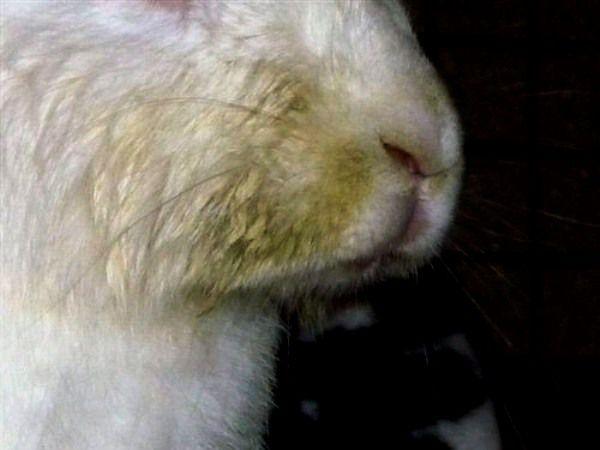
Forms of the disease, danger to animals and humans
Stomatitis in the absence of treatment and any sanitary measures can lead to the death of young rabbits. If the animals are not treated, the strongest can survive, but then they will lag behind in development.
More often, small rabbits die from stomatitis. In adults, the mortality rate is low. The virus is not dangerous for humans, however, it is not recommended to eat the meat of rabbits that have died from stomatitis. If the animal is ill and recovered, it can be fattened up, and then (after a few months) sent to the slaughterhouse. Recovered rabbit meat is allowed to be eaten after heat treatment.
Forms of the disease:
- initial (light) - the appearance of redness on the oral mucosa, then white bloom, brownish spots, slight salivation;
- acute (severe) - the formation of erosions and ulcers, increased salivation, diarrhea, lack of appetite;
- atypical - slight salivation, warm nose.
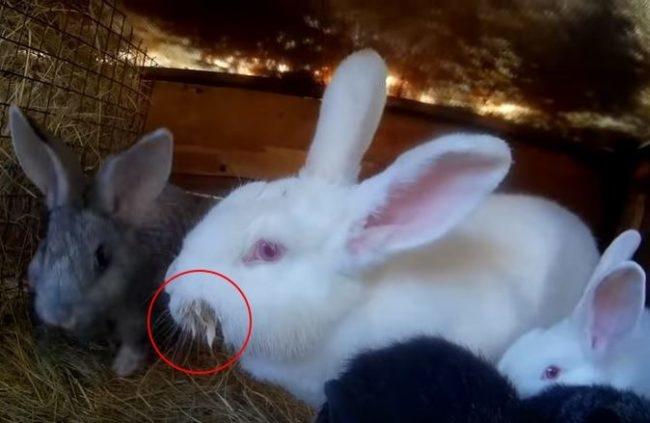
The initial stage lasts about 10 days, and then it smoothly flows into the acute stage (another 5-7 days). Symptoms increase every day: the animal is inactive, diarrhea, does not eat anything, without treatment it may die.
Safety measures upon detection of infection
The behavior of rabbits must be constantly monitored. If the animal refuses to feed, is inactive or has profuse salivation, it must be placed in an isolator. This is a special cage located in another room. An infected animal must live for some time (30-40 days) away from other rabbits.
It is recommended to feed patients with soft food during quarantine. Animals are given alfalfa hay, wheat and barley sprouts, pumpkin, carrots, water. Only a veterinarian can diagnose sick rabbits. Viral stomatitis lasts at least 10 days. Previously, this disease does not go away, even if treatment is started.
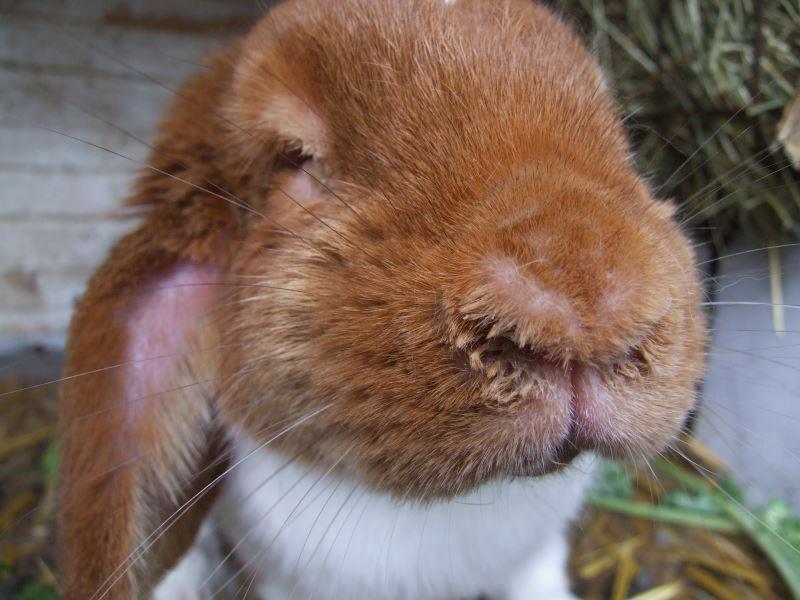
How to treat stomatitis in rabbits
If profuse salivation is found, the rabbits can be given pure streptocide. Dose: Pour 0.2 grams of powder into your mouth once a day, repeat the procedure every other day. The medicine can be bought at a veterinary pharmacy. It should be powder, not pills. Streptocide does not cure the virus, but relieves the condition of the animal. To increase the immunity of rabbits, you can inject immunocorrectors (Gamavit, Katazol).
Antibiotics
It is advisable to treat infectious stomatitis with an antibiotic. Rabbits do not respond well to the penicillin group. Veterinarians usually prescribe Baytril or Biomycin. Injections are given in the back thigh (middle part). Baytril 2.5% is prescribed to babies from 30 days of age. Dose: 0.2 ml per 1 kg of body weight, once a day. The course of treatment is 5 days. You can dilute 1 ml of the drug in 1 liter of water and irrigate the oral cavity with this solution using a syringe once a day. For douching the mucous membrane, you can use "Tetracycline". Dissolve 1-2 tablets in 1 liter of water. The oral cavity is irrigated once a day until the symptoms disappear completely.
Important! After using antibiotics, it is recommended to give rabbits probiotics to improve the intestinal microflora ("Olin").
You can buy Tetracycline ointment and use it to treat the surface around the nose and mouth. For the treatment of stomatitis, "Travmatin", "Traumeel", "Liarsin" are used. These are not antibiotics, but anti-inflammatories.Before using them, you need to consult your veterinarian.
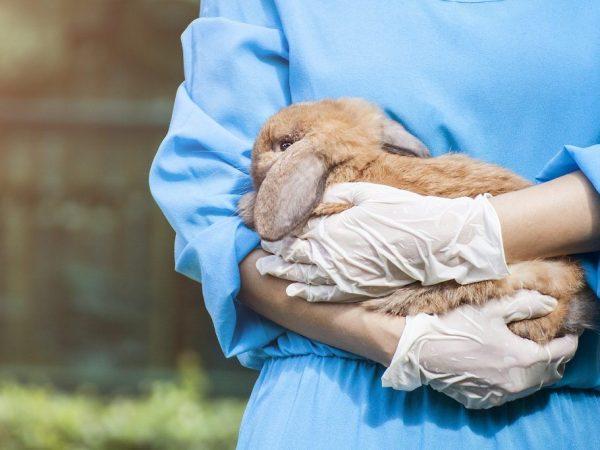
Important! Do not give animals all available stomatitis medications. Rabbits are treated with one remedy. An injection and irrigation of the oral cavity is done once a day, not more often. The illness will last at least 10 days. No medications affect the speed of recovery.
Folk remedies
When stomatitis is detected, it is customary to rinse the oral cavity. Most often, a slightly pink solution of potassium permanganate is used. Sores in the mouth can be lubricated with Lugol with glycerin. The procedure is carried out no more than 1 time a day, 5-10 days in a row, until the inflammation completely disappears. Sick animals, instead of water, can be given a decoction of chamomile, calendula, sage, oak bark. Propolis solution is used to irrigate the oral cavity. It is recommended to keep sick animals clean.
Rehabilitation of recovered animals
Recovered animals can be quarantined for about 30-40 days, and then transferred to a common cage or to the same room with other rabbits. Such animals will no longer get stomatitis. They can be fed with regular feed, and after reaching a certain age, sent to the slaughter. It is better not to use such animals for breeding. There is a possibility that the offspring may also develop stomatitis.
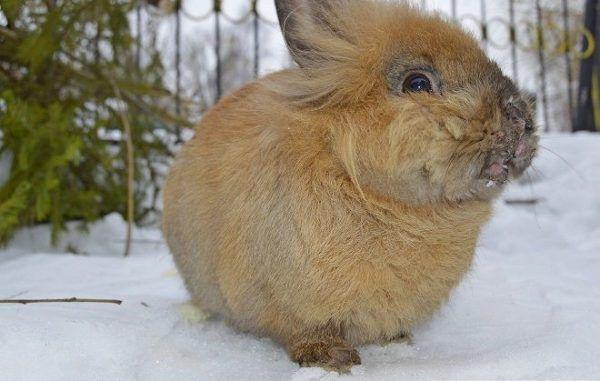
How to protect rabbits from biting midge
Animals will not get sick if, from the moment they leave their mother, they are provided with adequate nutrition and constantly cleaned and disinfected cells. The feed must be dried. During this period, it is better for rabbits to give hay dried in the sun, clean carrots, pumpkin, and crushed dry grains.
The bedding in the cage should be changed daily. In the room itself, it is recommended to do cleaning, airing every day, and once a month - whitewashing with slaked lime.
The cage should always be dry, but not cramped, not stuffy and not hot. Rabbits will not get sick if they are timely dewormed, vaccinated, removed from fleas, increased immunity with the help of vitamin preparations and immunocorrectors. Iodine can be added to drinking water once a week (1 drop per 1 liter). The daily diet should contain root crops, juicy greens, sun-dried grass, vegetables, grain, mixed feed, branches.

